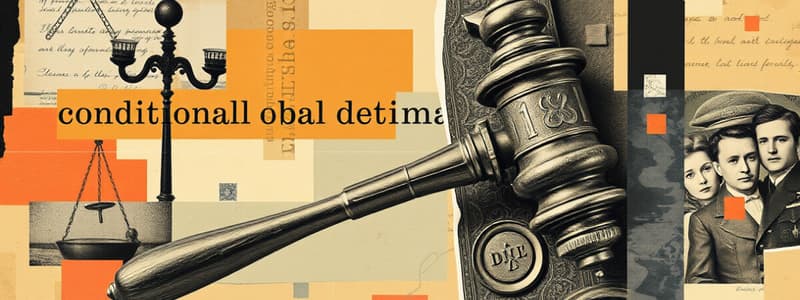Podcast
Questions and Answers
In conditional obligations, the omission of an ______
In conditional obligations, the omission of an ______
act
The acquisition of rights depends upon the happening of an ______
The acquisition of rights depends upon the happening of an ______
event
A conjunctive condition requires that all conditions must be ______
A conjunctive condition requires that all conditions must be ______
fulfilled
In a disjunctive condition, only one or some of the conditions must be ______
In a disjunctive condition, only one or some of the conditions must be ______
A divisible condition is susceptible of ______ performance
A divisible condition is susceptible of ______ performance
An indivisible condition is not susceptible of ______ performance
An indivisible condition is not susceptible of ______ performance
A potestative condition depends upon the sole ______ of one of the contracting parties
A potestative condition depends upon the sole ______ of one of the contracting parties
In a suspensive condition, the obligatory force is entirely dependent on a future, ______ event.
In a suspensive condition, the obligatory force is entirely dependent on a future, ______ event.
The creditor may go to court to prevent the ______ of the property.
The creditor may go to court to prevent the ______ of the property.
The obligation is a ______ obligation.
The obligation is a ______ obligation.
The obligation is subject to a ______ condition.
The obligation is subject to a ______ condition.
The debtor is entitled to recover what he has paid prior to the happening of the ______ condition.
The debtor is entitled to recover what he has paid prior to the happening of the ______ condition.
Physical loss occurs when a thing ______.
Physical loss occurs when a thing ______.
Legal loss happens when a thing goes out of ______.
Legal loss happens when a thing goes out of ______.
Civil loss occurs when a thing disappears in such a way that its ______ is unknown.
Civil loss occurs when a thing disappears in such a way that its ______ is unknown.
Loss of the thing without the debtor’s ______ is a situation addressed in Article 1189.
Loss of the thing without the debtor’s ______ is a situation addressed in Article 1189.
The rights of third parties who acquired the property in good faith are protected despite the ______.
The rights of third parties who acquired the property in good faith are protected despite the ______.
In obligations to give, the obligation is considered extinguished as if it never ______.
In obligations to give, the obligation is considered extinguished as if it never ______.
Bilateral obligations are when both parties are mutually bound to ______ with each other.
Bilateral obligations are when both parties are mutually bound to ______ with each other.
When only one party is obliged to perform, it is considered a ______ obligation.
When only one party is obliged to perform, it is considered a ______ obligation.
If a third party holds an item in good faith, restitution claims are against the original ______ involved.
If a third party holds an item in good faith, restitution claims are against the original ______ involved.
Retroactive effects vary between bilateral and unilateral obligations based on the parties’ ______.
Retroactive effects vary between bilateral and unilateral obligations based on the parties’ ______.
Reciprocal obligations arise from the same cause, where each party is a ______ and creditor of the other.
Reciprocal obligations arise from the same cause, where each party is a ______ and creditor of the other.
Effects of fulfillment of a ______ condition impact the obligations involved.
Effects of fulfillment of a ______ condition impact the obligations involved.
The law does not require that the obligor acts with ______ or fraud.
The law does not require that the obligor acts with ______ or fraud.
A party cannot gain an advantage from his fault or bad ______ at the expense of another party.
A party cannot gain an advantage from his fault or bad ______ at the expense of another party.
This does not apply if the act of the obligor is in the exercise of a ______.
This does not apply if the act of the obligor is in the exercise of a ______.
Constructive fulfillment of ______ condition impacts the retroactive effect of an obligation.
Constructive fulfillment of ______ condition impacts the retroactive effect of an obligation.
They must use sound discretion, considering the ______ of the parties.
They must use sound discretion, considering the ______ of the parties.
The effects of a conditional obligation to give shall retroact to the day of the ______ of the obligation.
The effects of a conditional obligation to give shall retroact to the day of the ______ of the obligation.
In reciprocal obligations, there is no retroactive effect on fruits and ______.
In reciprocal obligations, there is no retroactive effect on fruits and ______.
This rule simplifies the accounting process by assuming that the benefits accrued during this period are equitably ______ between the parties.
This rule simplifies the accounting process by assuming that the benefits accrued during this period are equitably ______ between the parties.
An obligation with a ______ is one whose effects are subjected to the expiration or arrival of said period.
An obligation with a ______ is one whose effects are subjected to the expiration or arrival of said period.
The liability of the first ______ shall be equitably tempered by the courts.
The liability of the first ______ shall be equitably tempered by the courts.
If both parties have committed a breach of the obligation, the same shall be deemed ______.
If both parties have committed a breach of the obligation, the same shall be deemed ______.
A ______ is a future and uncertain event upon which an obligation may arise or be extinguished.
A ______ is a future and uncertain event upon which an obligation may arise or be extinguished.
Article 1192 deals with breaches in ______ contracts where both parties have failed to perform their obligations.
Article 1192 deals with breaches in ______ contracts where both parties have failed to perform their obligations.
As to fulfillment, a period is future and ______, while a condition may be future and uncertain.
As to fulfillment, a period is future and ______, while a condition may be future and uncertain.
The first infractor shall be liable if it cannot be determined which of the parties first ______ the contract.
The first infractor shall be liable if it cannot be determined which of the parties first ______ the contract.
A period refers to ______ time, while a condition may refer to unknown past events.
A period refers to ______ time, while a condition may refer to unknown past events.
Study Notes
Conditional Obligations
- Conditional obligations are dependent on specific events for the acquisition or extinguishment of rights.
- The effect of a condition can lead to the performance or non-performance of contractual duties.
Types of Conditions
- Conjunctive Conditions: Multiple conditions must all be met.
- Disjunctive Conditions: Meeting any one or more of several conditions suffices.
- Divisible Conditions: Conditions can be partially performed.
- Indivisible Conditions: Conditions must be entirely fulfilled.
Potestative Conditions
- These are suspensive conditions rooted entirely in the will of one party.
- Obligation's validity is contingent on an uncertain future event.
Effects of Conditions
- When a suspensive condition is met, it triggers the acquisition of rights.
- Courts assess how the fulfillment of conditions retroactively affects obligations, considering intent and fairness.
- Retroactive effects apply to obligations as of the time of the original agreement once conditions are satisfied.
Rights Pertaining to Conditions
- Creditors' Rights:
- They can seek court intervention to prevent property alienation.
- Rights can be annotated on property titles to protect against actions that could negate obligations.
- Debtors' Rights:
- Debtors can reclaim payments made before the occurrence of a suspensive condition.
Types of Loss
- Physical Loss: When an object is destroyed.
- Legal Loss: When an object becomes illegal or ceases to exist in commerce.
- Civil Loss: When an object's existence becomes unknown, whether factual or legal.
Rules on Loss During Pendency
- Courts can determine the impact of loss or improvement on retroactive effects of obligations.
- Rights of good faith third-party acquirers are upheld despite conditions.
Obligation Types
- Unilateral Obligations: Only one party is obligated to perform.
- Bilateral Obligations: Both parties bear obligations, acting as mutual debtors and creditors.
- Reciprocal Obligations: Exist when obligations of both parties are interconnected; fulfilled obligations are equivalent to each other.
Period vs. Condition
- A Period is a definite future event affecting obligations, while a Condition is uncertain and depends on an event that may have already occurred.
- In case of breaches, if both parties fail to fulfill obligations, courts equitably adjust liability.
Article 1192 on Breach of Contract
- Addresses breaches in reciprocal contracts with no clear first infractor.
- Obligation may be deemed extinguished, with each party responsible for their own damages.
Studying That Suits You
Use AI to generate personalized quizzes and flashcards to suit your learning preferences.
Related Documents
Description
This quiz focuses on the concept of conditional obligations, exploring how the omission of an act can affect the acquisition and extinguishment of rights. It covers the different types of conditions, including conjunctive conditions where multiple requirements must be met. Test your knowledge on the principles governing conditional obligations.




